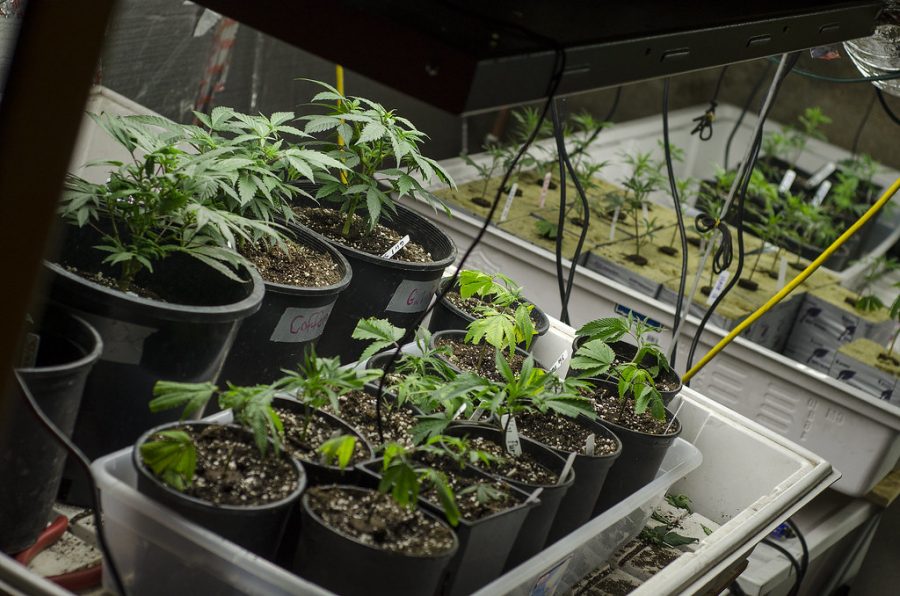Marijuana shouldn’t be illegal. Here’s why.
Legal marijuana being grown in Colorado.
Mar 17, 2022
Have you ever smoked marijuana?
I know that’s a bit of a loaded question, but more and more people seem to be answering “yes”. As of 2021, approximately 49% of American adults have at least tried marijuana, an all-time high (pun intended). With numbers that high, you’d think marijuana was a thriving billion-dollar business without stigma. You’d be wrong, as marijuana is still prohibited federally and illegal for all intents and purposes in 17 states. These laws are relics of a bygone era, where “reefer madness” was believed to be ravaging America’s youth, and when hippies were littering the streets with paraphernalia. In the 21st century, when science has advanced enough for us to actually closely study this controversial little leaf, combined with its legalization in several states, its continued legal condemnation is nothing short of insane.
First off, marijuana offers many medicinal benefits. Marijuana is noted for its pain relief capabilities, particularly with cancer patients. In addition, it is noted as a useful anti-inflammatory, making it particularly useful for illnesses like Crohn’s disease and arthritis. It is also perfect for numerous neurological disorders, like anxiety and Parkinson’s. It’s no wonder 44 states have some sort of law allowing some forms of medical marijuana. Plus, it is one of the safest narcotics out there, as it is near impossible to overdose on it (though that still means you shouldn’t overdo it). Compare that to legal narcotics, like tobacco and alcohol. Every year, 480,000 Americans die from tobacco smoke, while 95,000 die from alcohol-related causes. When compared to what is currently legal, one can’t argue that marijuana’s illegality is for the sake of public health.
Another reason marijuana should be legal is because of how much money it produces. Take the case of Colorado, the first state in the Union that legalized full-use marijuana in 2012. In 2021, the state of Colorado generated $2 billion in revenue, which translated into $387 million in tax revenue. That is a nice little chunk of change. Can you even imagine what a state like Ohio could begin to do with that kind of money? That’s not even mentioning the jobs and investment opportunities that would arise at the legalization of marijuana. Lastly, it would also save governments money, as they would no longer have to enforce marijuana laws. Federal marijuana law enforcement costs the US government roughly $3.6 billion annually. With full legalization, that money could be put to use elsewhere, instead of being used to uphold archaic laws.
The final reason to support the full legalization of marijuana is its effects on the criminal justice system. For a narcotic that offers little harm aside from red eyes and impaired motor skills, this country seems hell-bent on policing to the extreme in order to combat the “scourge” that is marijuana. As previously mentioned, our governments spend an insane amount of money on enforcing pre-existing marijuana laws, contributing to the mass amounts we tend to spend on law enforcement. However, it also becomes a racial issue as well. Despite using marijuana at nearly identical rates as Caucasians, African-Americans are 3.73 times more likely to be arrested for marijuana possession, a statistic that contributes to the scourge of mass incarceration. We should not be severely punishing people for possession of such a low-tier drug; we shouldn’t be punishing them at all. And the legalization of marijuana can help to combat the over-policing of America.
Ultimately, there is a near 50-50 chance any American reading this has tried marijuana. If you have, ask yourself: was it the vile poison decades of propaganda told you it was? Legalizing marijuana would not only provide economic benefits but would help provide health benefits for those who need it, as well as combat mass incarceration and over-policing. It is often joked that America declared a War on Drugs, and the drugs won. Rather, I posit that people realized that marijuana was not the boogeyman we were led to believe.
Patrick Kane is a junior from Lakewood, Ohio and the World News Editor. He can be reached at pkane23@jcu.edu, on Twitter at @therealpatkane, or on Instagram at pkdonuts5.














Jason Harvey • Nov 24, 2023 at 2:37 am
Great Post! There are strong arguments in favor of marijuana legalization, it’s essential to consider potential drawbacks, such as the impact on public health, youth access, and the need for effective regulation to address these concerns. The debate over the legality of marijuana continues to evolve, with ongoing discussions at both the state and national levels.